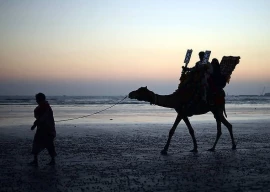
Pakistan enters 2012 with a great deal of uncertainty. Many predict this will be election year in the country as tensions continue between the government, the military and the judiciary. Others argue that the government has regained its balance and is now in a position to trudge through to 2013 - the scheduled end of its tenure.
However, if one were to be part of the numerous rallies taking place in the country, what is clear is that most major political parties have already started their election campaigns. The question is: when will the prime minister take a decision to follow suit?
As things stand, the ruling party is in a comfortable position. Any challenge from the Tehreek-e-Insaf will cut into the vote bank of the PML-N. Yet there are also reasons to be worried. While the prime minister has managed to gain the distinction of being the longest serving elected chief executive, one wonders how long it will be before the state of the economy catches up with him politically.
The country is already grappling with a power and fuel crisis. This will impact prices at home as well as hurt exports, which in turn means dampened foreign exchange earnings. At the same time, it will limit the already limited foreign direct investment which is much needed for the country to create both economic activity and employment.
The problem is that as elections approach, the government will be unable to take the tough economic decisions needed to set things right. The bailouts will continue and tax shortfalls will be met through borrowing and arbitrary taxation measures.
On the political front, a lot depends on how President Asif Zardari and General Ashfaq Parvez Kayani move forward. The relations between the government and the army are increasingly based on mistrust – initially created by the discovery of Osama bin Laden in Pakistan and later exacerbated by the Memogate scandal, which led to the prime minister accusing the military leadership of conspiring against his government.
It is still unclear who is actually in the driving seat in Pakistan. In the standoff over the detention of Raymond Davis in January 2011, it was the ISI that paved the way for a solution. The military also nurtures alternate parties and groups as if to keep a check on the rise of any one mainstream political party in Pakistan.
What became clear after the murder of former Punjab governor Salmaan Taseer in January was that the establishment abetted religious parties in challenging the state. It was a dangerous precedent. The TTP raid on a naval airbase in Karachi and the subsequent murder of journalist Saleem Shehzad suggests that our angels are not learning from their past experiences.
The rise of Imran Khan’s PTI is being attributed to support from the ISI’s officially defunct political wing. The party went from being a non-entity a year back to now challenging the main opposition Pakistan Muslim League Nawaz (PML-N) for seats in Punjab, and has emerged as a credible third force in Pakistan’s turbulent political scene.
If that is not enough uncertainty, more will come in the form of an active Supreme Court which continues to pull the government into court in various cases. Many analysts believe that the ultimate objective of those cases is to bring down President Zardari. The president, who has a lot to answer for, is claiming immunity by sheer dint of his office. This tussle is expected to continue in the year.
On the external front, while Pakistan’s relations with its immediate neighbours, including India, continue to improve, there seems to be a shift in its relationship with the United States, its biggest source of external funds.
Overall, the internal security situation in Pakistan will remain uncertain with the military operation continuing in the tribal areas and the insurgency gaining ground in the Balochistan province.
With sectarian violence being fuelled by pro-Taliban outfits operating all over the country, there are fears that suicide attacks will continue. However, with the TTP and the government entering into negotiations, the attacks on government installations and functionaries are expected to reduce in the year.
It is a mixed bag that awaits Pakistan in 2012, though most of it is bad news. If at all, the silver lining may be that the country continues to move along with all its problems, in the hope that things will get better in the coming years.
Published in The Express Tribune, January 1st, 2012.
COMMENTS (19)
Comments are moderated and generally will be posted if they are on-topic and not abusive.
For more information, please see our Comments FAQ










































pakistan's government needs to focus on pakistan as a country..it should forget about teh world and the region..unless things can be set right at home there is no way forward...teh government should have a simple agenda like improving the law and order situation and what the people need most electricity and gas...controlling prices and seeing to jobs...the international terrorist network has been dismantled to a large extent and terrorism now only exists in pakistan ...pakistan cannot solve its problems just by following a US agenda...nor should it sit idol as teh US attacks its border posts and continues its drone attacks...Since there is no terrorism in teh USA drone attacks are just not justified...pakistan like teh rest of teh world should only think of itself and its interests...The iSi should also realize that its focus outside should only be on atmost kashmir and to a limited extent afghanistan...liberation movements cannot be fought peacefully but negotiations should be expected to deliver...
Many of Pakistan's problems stem from terrorist violence, particularly by the TTP.
Now there are signs that the tide is turning against the TTP.
The TTP has been battered by Pakistani military operations and U.S. drone strikes. It is splintered into more than 100 smaller factions, significantly weakened and running short of cash, according to security officials, analysts and tribesmen from the insurgent who spoke to the reporters of the Associated Press (AP).
There have been no major terrorist attacks in Pakistan since the the Mehran Naval Base siege in Karachi in May, 2011.
Death toll from terrorism declined for the third year in row, according to South Asia Terrorism Portal. After hitting a peak of 11,704 in 2009, number of deaths fell to 7,435 in 2010 and 6,048 in 2011.
http://www.riazhaq.com/2011/12/tide-turning-against-ttp-militants-in.html
Happiness will be prevailing in the upcoming future of Pakistan (Insha-Allah). But only a little belief, effort and patience is required.
@hedgefunder: I agree with your views. There are no quickfix solutions like announced by IK of solving problems in three months time. I feel even a period of five years might be insufficient to put back the Pak economy on rails vis-a-vis solving the other major problem ie militancy which is unlikely to disappear after Americans leave this region and which is again a wishful thinking.
@AJ and Hu Juntao
Read the following new reports and then come to your senses. These people are experts on Pakistan and have decades of studies:
Solve the Pakistan problem by redrawing the map http://www.theglobeandmail.com/news/opinions/opinion/solve-the-pakistan-problem-by-redrawing-the-map/article2278388/
Pakistan's Road to Disintegration http://www.cfr.org/pakistan/pakistans-road-disintegration/p23744
@dv sikka: Welfare of Pakistan's citizen is the last piority of its Govt and Army ! Yet, people still fall for their lies and promises ever since its creation. Now they all think they have a new messiah in form of IK, well he is well out of his depth to be able to find quick solutions for the country's problem !!! Popularity does not solve problems, facing facts and making tough decisions do !
There is no hope of a prosperous future for Pakistan so long it continues its policy of hate with neighbours. It is time that the leaders think of the welfare of Pakistan citizens.
@ Clint Eastwood: The only people that are in destructive mode are the people of Europe and usa with all the golden economic crisis on your shores; you are all in treat for a lot of fun with jobs, businesses and money and try to have as much fun as you can have because this is your last year I guess, 2012 and please stop trolling.
@Mirza: we have been friends with the democracy, USA. And they do drone strikes and kill our civilians everyday. We are also freinds with communits, e.g. China. They do not do drone strikes or kill our people, they are better than DEMOCRACY USA!!!
2012 willbe very testing year for Pakistan, as it will have to deal with the economy going into meltdown, also will have decide its long term foreign policy as that is in tatters at present and learn to live witout Aid and to start taxing its people and stop sunsidising the energy and fuel, as it simply will not be afford to fund it. They will definately have to find a new benefactor for funds as US funding is over ! the two candidates in the frame are Chinese, who simply do not give anything away without a return for them and the Saudis who really have not shown any enthusiasm at the idea, also Pakistan new "strong relationship " withits neighbours, Iran has not gone down very well with Saudis. So who else is left? They will need the money !!
@Clint Eastwood: Are you out of your child crawler? I hardly believe you could see that even in your perverted dreams
PPP could not come up with the expectations of the poor people of Pakistan and has paved the way for the “third force” to interfere to keep the national interest supreme.
When I write about the “third force” this does not mean Pakistan Army, but it is going to be a “third force” which people of Pakistan are going to make through a change in the government by the ballot in the next general elections.
The only solution to save Pakistan’s economy, internal and external challenges can only be met when the middle class people who are in majority will start ruling the country and at the same time will tell to the elite as what they are suppose to do.
Pakistan has been made hostage since independence by the such people who were nothing at the time of creation of Pakistan by Father of the Nation, Quaidi-e-Azam Mohammad Ali Jinnah and have now become every thing to decide the fate of a common man, who is the actual force to turn around the wheel of the economy.
The hands of 98% people in majority have been tied-up by the 2% people in minority which is a grave concern, not only for the people of Pakistan but also for the international community.
What the country needs is to make major reforms to put the country right on the track by all means; otherwise I can see that a blood-bath revolution is waiting to take place in Pakistan in the very near future.
To keep Pakistan intact from further breakup, 98% people of Pakistan in majority needs to be freed from the rest of the 2% people in minority.
The day of accountability and judgment is not very far from now. We have two options to consider: (1) Do we want to see Pakistan to breakup in different parts or (2) we need to keep the remaining Pakistan intact?
I leave the judgment on the valued readers of Express Tribune.
“If at all, the silver lining may be that the country continues to move along with all its problems, in the hope that things will get better in the coming years.”
Don’t have high hopes Pakis, you are in a self destructive mode and ready to be disintegrated into the oblivion. Afghans to claim their lost land once again, Insha Allah. And Durand Line to be used for your strangling lines. Your nukes soon to be pukes into the Indian Ocean. Mark my words.
Excellent overview!
Both the civilian govt and military have their own agenda and pulling in different directions are not functioning for the welfare of Pakistan.
Pakistan has to decide whether they want to be friends only with the worst dictatorships in the world (like China, North Korea, S. Arabia, UAE, etc) or join the community of civilized and democratic nations. They would have to decide whether they want to continue to harbor the worst terrorists in the world and cause trouble for all its neighbors or live in peace and harmony. If the policy of protecting strategic assets and nurturing jihadists we would be branded a terrorist nation. Also if ISI does not shape up then Mansoor Ijaz’s demand that it be called a terrorist organization would gain momentum in the US.
worst yet to come